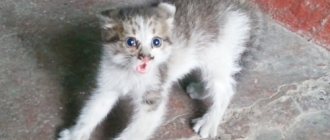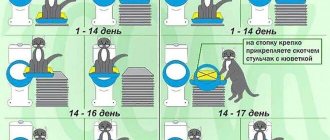A neutered cat wants a cat: reasons
If a cat was castrated at a young age before he had sexual experience, he does not walk on the street and there are no females in the apartment, then in most males the sexual desire disappears after sterilization. But when surgery occurs after the male cat has been bred, the habits can last a lifetime.
For some time, testosterone produced by the testes circulates in the blood, and if a month after the operation the cat smells a leaking female, he becomes excited. Even in most adult males, the desire to cover cats disappears after several months and sometimes years.
Why does a neutered cat ask for a cat?
Some owners are faced with an unpleasant surprise - a neutered cat continues to call the cat and mark the territory, what is the reason?
To save yourself from problems with marks and your pet from stress, you need to castrate him before entering the active phase of sexual estrus. The optimal age for castration varies from 7 to 9 months.
Note! The larger the cat, the sooner he will be neutered. Castration before the cat begins to mark gives a greater chance of eliminating problems in the future.
Urine marking is instinctive, but quickly becomes a habit. There are cases where neutered cats did not mark territory, but imitated this process
Castration before the cat begins to mark gives a greater chance of eliminating problems in the future. Urine marking is instinctive, but quickly becomes a habit. There are cases when castrated cats did not mark their territory, but imitated this process.
After castration, it takes from 3 to 12 months to balance the hormonal levels. The sooner a cat is neutered, the sooner its hormonal levels will become “even.” Depending on heredity, after the initial balancing of hormonal levels, the cat will experience:
- Equal levels of estrogen and testosterone.
- Predominance of testosterone.
- Predominance of estrogen.
If a cat has a predominance of testosterone, he continues to behave in a very masculine manner: fight, mark, call the cat, etc. If estrogen outweighs, the cat becomes more affectionate, playful and flexible.
Normally, 6–12 months after castration, hormone levels will become equal, which will be expressed by the following signs:
- The urine will lose its bright odor.
- The cat will stop marking its territory with urine and feces.
- The cat will more fiercely control and protect the territory from strangers.
- For other cats, your pet will become uninteresting as a sexual object - there will be no fights with males, no screams to attract cats, etc.
- The pet will become more playful, since energy is not spent searching for a sexual partner.
- A cat can gain weight if its diet is not balanced.
Are there cats that do not mark even if they are not neutered? Oddly enough, yes. Some breeds of cats that have been professionally bred for decades inherit a special gene that deprives the male of the desire to mark territory with urine.
It is important to understand that genetic inheritance in this case is passed on from father to son. However, even if your cat’s father and grandfather did not mark the territory, this does not give you (as a potential kitten owner) any guarantees
What to do if a cat wants a cat after castration
The situation arises when several animals of the opposite sex live in the same room. If the owner does not like that the castrato is trying to cage and there are several rooms allocated for the needs of cats, the animals are seated. If a male who has recently been castrated shows interest, hormonal contraception is used. A veterinarian will help you choose the right remedy. If the layout of the apartment allows, animals of different sexes are seated during estrus.
Be sure to read:
A cat after castration: when he comes to his senses, postoperative care, does behavior change, complications?
Despite the fact that the pet’s behavior does not suit the owner, the pet cannot be punished. Otherwise, a stressful situation will arise in which the animal becomes aggressive.
To distract the animal from acquired habits, it is occupied in the following ways:
- Expansion of vertical territory. The cat wants to have safe places for rest and entertainment. Beds are placed on the window, shelves are attached to the walls, as well as hammocks. The cat climbs on a hill and feels comfortable.
- Using a scratching post will protect upholstered furniture, allow the cat to relax and relieve stress.
- Interactive toys increase physical activity and distract from other activities.
- If there are several cats in the apartment, you need to place a feeder and tray for each in different places.
In some situations, the owners themselves provoke the cat into inappropriate behavior. Stroking and squeezing the animal affects the erogenous zones, and the pet becomes excited. At such moments you should stop communicating.
Why does a cat want a cat after castration - behavioral characteristics before and after
An emasculated cat is quite capable of mating. This is not difficult to understand - the castrato tries to mount the cat, if there is one, and makes movements similar to sexual intercourse with a soft toy and with any soft object. Especially if he already had such experience. The owner, unknowingly, begins to blame the veterinarian who operated and find out whether a neutered cat can mate with a cat.
Cat, mating
Sometimes the reason is the method of castration or sterilization. Experts use the following options:
- orchiectomy, or cutting out the testes;
- vasoresection (ligation of the spermatic cords);
- vasectomy (cutting the spermatic cord).
In the last two (if only sterilized) testosterone production does not stop. The desire to mate does not disappear. The cat performs full sexual intercourse, but without fertilization.
In the first case, the production of sex hormones is excluded. The cat ceases to be a male and loses interest in cats. Strong-smelling marks, nightly screams, and property damage are a thing of the past.
Need to know ! Castration reduces the risk of malignant tumors in the genitourinary area.
It would be wrong to expect changes in the cat's behavior. In ordinary life, he remains the same as he was before castration. The degree of activity and mobility will not decrease. The changes will affect only the sexual sphere. But you will have to completely reconsider the feeding scheme and diet. Now the cat does not need to spend calories on the production of seminal fluid, on active searching, courtship and sexual intercourse. Fights with rivals are also excluded. By the way, reductions in physical activity can be compensated for by additional walks and active games.
There are no problems with untied cats. After castration, all signs of sexual desire immediately disappear. They will no longer ask for the cat or mark.
The operation was performed by an unscrupulous doctor
The desire for sexual intercourse and conception can occur with incomplete castration. In 2% of cats, cryptorchidism is observed, that is, one or both testicles remain inside the pelvic cavity and do not descend into the scrotum. The testis can even be located in the thigh area, at the base of the penis, between the anus and the penis. In this situation, an inexperienced or unscrupulous doctor can cut out only what is in the scrotum, and the rest, which is fully functional, will perform its function.
Need to know ! Cryptorchidism is a pathology. It can be eliminated even without planning castration. The negative side of the phenomenon is that an undescended testis can degenerate into seminoma, that is, a cancerous tumor.
To avoid mistakes, before going to the veterinarian for surgery, the owner is recommended to personally palpate the cat’s scrotum. Two beans should be palpable.
Castration for cryptorchidism
The bad consequences of castration may also have another reason, for example, early emasculation. Intervention in the kitten's genitourinary system can lead to underdevelopment of the urethra, which will lead to inflammatory processes. A young animal is prone to catching a cold. There is also a danger of early castration - this is incomplete removal of the testis. The remaining part will produce a certain amount of sex hormones. The cat will be almost a full-fledged male.
Based on these reasons, experts recommend castrating the animal no earlier than six months. It is even better to wait until 7-9 months of age, or at least wait until both testicles descend into the scrotum.
Interesting ! There is no point in waiting for the testes to drop in a calico kitten. Only a cat can be tri-colored.
Typically, cryptorchid cats can be operated on only a year after birth or later. Therefore, it makes sense to wait for the testes to descend naturally. Otherwise, you will have to undergo abdominal surgery with removal of the undescended testicle and external surgery from the scrotum. In the future, such cats are no different from healthy ones.
Need to know ! Before the operation, it is necessary to donate blood and urine for analysis.
Cat examination
It wouldn't hurt to have a full examination by a specialist. Symptoms of cardiovascular and liver failure often lead to sad consequences. Complicating recovery from anesthesia. If such problems exist, examination and treatment should be carried out.
The operation can also lead to adverse consequences in the development of the body as a whole. Internal organs are formed with the participation of hormones, including sex hormones. Their exclusion can lead to chronic diseases, such as urolithiasis.
Important ! The operated animal should be taken away from the clinic only after complete recovery from anesthesia.
Little time has passed since castration
The ability of the adrenal glands to intensively produce male sex hormones (androgens) is also important. After removal of the testes, their concentration remains for some time. A cat can still impregnate a cat.
Temperamental cats with a strong sexual constitution may strive for sex even years after surgery. This is due to the production of sex hormones by the pituitary gland. Such hyperactivity should be leveled out with hormonal agents. The specialist will conduct the necessary examination and prescribe treatment.
Castration
The cat has already had contact with cats
An adult cat that has had sexual experience can continue to copulate at the level of instinct. A cat in estrus will still be attractive to a neuter. If 1-2 weeks have not passed after the operation, then intercourse may have consequences. The remaining viable sperm in the body are capable of fertilization. After this period, the process is pure physiology and does not need adjustment. This habit can last for months, years or a lifetime.
We must remember! For a cat, copulation with a castrato can result in a false pregnancy, which is not very good.
Can a cat go for a walk?
Unfortunately, binge drinking after sterilization cannot always be avoided. Cases when a female walks after sterilization are rare, but they do occur. A cat asks for a cat after surgery only as a result of the following factors:
- Poor quality sterilization;
- Hormonal duplication;
- Ectopic ovarian tissue syndrome.
The manifestation of signs of heat and the appearance of estrus is mainly characteristic of females that have been operated on already in adulthood. She walks because the animal’s hormonal background changes significantly after the operation.
Soon after sterilization, it is quite possible that primary signs of estrus will appear and she will most likely ask for a male cat again.
© shutterstock
Features of the operation
This operation is common; many cat owners resort to it. After surgery, some changes cannot but occur in the animal’s body. But they are not dangerous to his health. And castration is of great importance, especially for domestic cats.
When a cat periodically tramples and gets excited, screaming loudly at night from his desire, this creates a tense atmosphere in the house. What should owners do in such a situation? As a result, no one brings such a cat a cat anyway, and peace in the family is disrupted for many days.
ATTENTION! The operation, if performed by a good veterinarian, is not dangerous, is carried out quickly, and the recovery time is not long. The main thing is to properly prepare your pet for surgery and closely monitor it during the recovery period.
Castration does no more harm than those hormonal and other pills that would have to be given to an overexcited animal
The main thing is to properly prepare your pet for surgery and closely monitor it during the recovery period. Castration does no more harm than those hormonal and other pills that would have to be given to an overexcited animal.
The essence of the operation is that the doctor, after making small incisions near the scrotum, will completely remove the testicles or just tighten the seminal canals. Sterilization of cats is a more serious procedure that requires longer rehabilitation, because the cat’s entire uterus is removed.
Recommendations for the owner
If, after the operation and the recovery period, the pet still marks its territory, gets excited when a cat appears and asks to go for a walk, then the owner must consult a veterinarian. Most likely, the specialist will prescribe hormonal medications, as well as sedatives. This is done in order to calm the pet and correct its behavior.
If the cat has become aggressive, meows loudly and pesters the neighbors' cats, then you can spray water on it or distract it in any way. It could be:
- delicacy;
- toy;
- lesson with the owner.
This will help pacify the pet and will not harm it. There are also special sedatives:
- Fitex;
- Stop stress;
- Cat Baiyun.
The selection of the drug and dosage should be entrusted to a veterinarian.
The main reason for the preservation of the reproductive instinct in castrated cats is an incorrect or untimely procedure. If castration is successful, then the cat owner does not need to worry about why the neutered cat wants a cat. It is worth being patient and remaining calm. After some time, the condition of the mustachioed pet stabilizes.
After castration, you should strictly follow the veterinarian’s recommendations for a speedy recovery of the animal’s body. If suspicious symptoms appear (lethargy, refusal to eat, strange discharge from the operated area, etc.), you should immediately consult a specialist.
After removal of the gonads, the pet's behavior should change in a positive direction. If he continues to be sexually active, you should be patient and give the animal more time to adapt (especially if the operation was performed as an adult). If there are several cats of different sexes in the same house, you can temporarily isolate the “too active” pet. However, even if sexual intercourse occurs, there will be no offspring.
We invite you to familiarize yourself with Sinulox for dogs: composition, instructions for use
If your pet remains restless and aggressive for a long period, you should consult a veterinarian. Perhaps the reason for this condition lies in another hidden pathology. The doctor may also recommend sedative medications that will be effective in this particular case.











